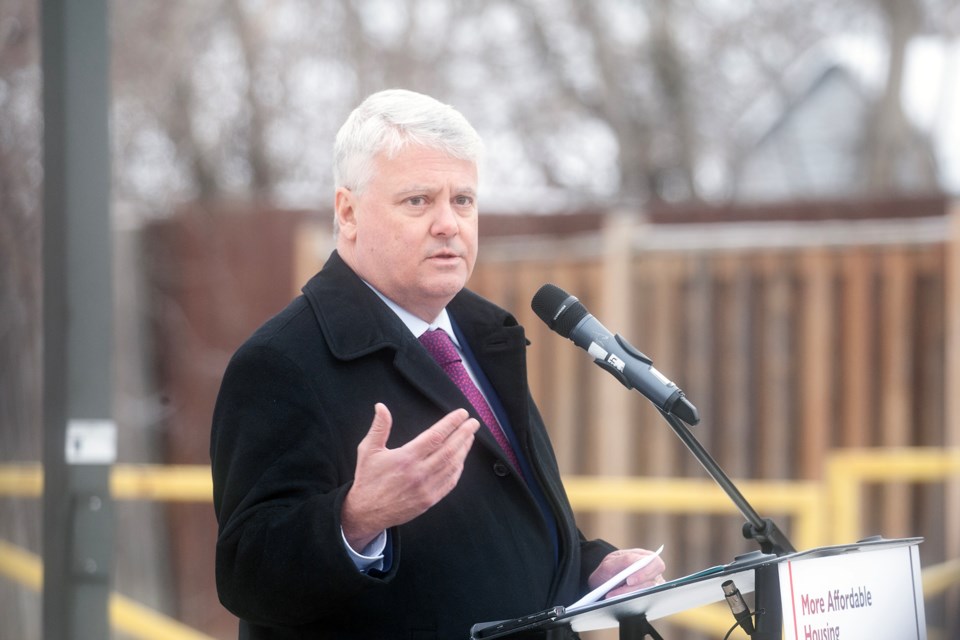The Northern Ontario School of Medicine (NOSM) will be able to enrol approximately 70 more students as part of the Trudeau government's recently announced $3.1-billion health accord with Ontario.
In a news release issued today, local MP Terry Sheehan announced that the government is investing $3.1 billion over the next three years to "help enhance Ontario's health care system."
This funding is part of a larger investment, negotiated with the provinces and territories to inject $200 billion into health systems across the country over the next 10 years.
He says the agreement will help:
- More Ontarians get regular access to a health care provider
- Expand enrollment in health care education programs by over 700 spots – including over 70 in the Northern Ontario School of Medicine
- Increase the number of family doctors, nurse practitioners, and registered nurses throughout the province
- Improve online access to medical records and enhance health data systems
The agreement will also make it easier for Canadian and internationally trained doctors and health professionals to practise in Ontario, so they spend less time dealing with red tape and more time helping patients in need. This includes removing barriers to foreign credential recognition, simplifying licensing processes, and increasing program access for highly educated and skilled health professionals.
"Our government is stepping up to help Ontarian families find care close to home, and I am glad that this deal was negotiated with the province specifically with the needs of Northern Ontario in mind," Sheehan said in the press release. "These dedicated resources will go towards helping communities like Sault Ste. Marie to attract and retain health care professionals such as doctors, nurses and PSWs to our region."
For more information, see the press release below.
Canadians deserve a health care system that gets them access to health services when and where they need them, including in small towns and Northern communities. This is why the Government of Canada is investing $3.1 billion over three years to help enhance Ontario's health care delivery system. This is part of a larger investment, negotiated with the provinces and territories to inject $200 billion into health systems across the country over the next 10 years.
The agreement will help:
More Ontarians get regular access to a health care provider
- Increasing the percentage of people in the province who have access to family health professionals to 91 per cent by expanding current interprofessional family health teams and forming 18 new ones in communities with the greatest needs, such as vulnerable or marginalized communities. This will ensure better access to care for patients without a regular source of family health care;
Increase the number of family doctors, nurse practitioners, and registered nurses throughout the province
- Increasing the number of family physicians by 600, nurse practitioners by 600, and registered nurses by 3000 across the province to help increase the health workforce and reduce backlogs;
- Expanding enrollment in health care education programs by over 700 spots – including over 70 in the Northern Ontario School of Medicine
- Boosting surgeries, MRIs, CT scans, and cancer screenings across the health care system.
Improve online access to medical records and enhance health data systems
- Increasing the percentage of people in the province who have access to their own health information electronically to 40 per cent, helping them take control of their health; and
- Increasing the percentage of health care professionals who can securely access and share patient health information electronically to 49 per cent, improving the efficiency of Ontario’s health care system and increasing patient safety.
The agreement will also make it easier for Canadian and internationally trained doctors and health professionals to practise in Ontario, so they spend less time dealing with red tape and more time helping patients in need. This includes removing barriers to foreign credential recognition, simplifying licensing processes, and increasing program access for highly educated and skilled health professionals.
The deal requires the provincial government to modernize digital infrastructure, including information reporting, collection, sharing. By expanding the availability of electronic health information and increasing the number of health care professionals who can securely access and share this information, health care will be more convenient, connected, and patient-centred.
Mental health is also a central pillar of this important investment. Ontario will add five new Youth Wellness Hubs to the 22 that have opened since 2020, making it faster and easier for youth to connect to much needed mental health and substance use services in rural, remote, and Indigenous communities. The Province will also continue to expand its Structured Psychotherapy Program, helping thousands more Ontarians get timely help for depression or anxiety through free cognitive behavioural therapy and other related supports. Both levels of government will also work with Indigenous Peoples to address gaps and systemic inequities in Indigenous health care services and improve access to culturally safe care.
While working to implement this new funding agreement, the federal government is also working with provinces and territories to implement a second bilateral agreement focused on helping Canadians age with dignity close to home, with access to home care or care in a safe long-term care facility.
QUOTES
"Our government is stepping up to help Ontarian families find care close to home, and I am glad that this deal was negotiated with the province specifically with the needs of Northern Ontario in mind. These dedicated resources will go towards helping communities like Sault Ste. Marie to attract and retain health care professionals such as doctors, nurses and PSWs to our region."
– Terry Sheehan, Member of Parliament for Sault Ste. Marie and Parliamentary Secretary to the Minister of Labour and Seniors
